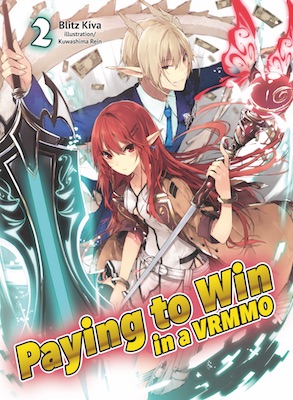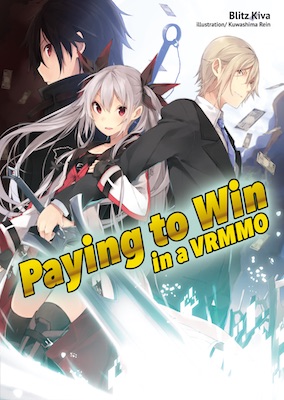By Blitz Kiva and Kuwashima Rein. Released in Japan as “VRMMO wo Kane no Chikara de Musou suru” by Hobby Japan. Released in North America digitally by J-Novel Club. Translated by Elizabeth Ellis.
The afterword mentions that this volume’s story was not part of the original webnovel, but was especially written for the books in order to try to flesh out Sakurako/Kirschwasser’s character, as she doesn’t get much to do in the main series. She gets a lot more to do here, and I like her determination and devotion to the game, but I wish that we’d gotten a little bit more of the mysterious backstory she has – it’s hinted she’s “had a rough life”, but that doesn’t really go anywhere, and we don’t have any flashbacks to how she met Ichiro. The author, in the afterword, notes that Sakurako’s age was a factor – not with him, but with the editors, who apparently think that being a Christ\mas Cake makes you unable to be a heroine. Bleah. That said, her scenes were good, even if the novel, understandably, feels like it’s just marking time.
The fight between Nem and Iris occupies most of this volume, and you feel frustration with both of them, though obviously far more with Nem. I kept feeling a sort of tension regarding their real-life identities – given Megumi’s irrational jealousy of Iris, finding out her real-life identity would be catastrophic, as she can and would destroy Iris’ life. Fortunately, this is likely not that serious a series, and instead the whole confrontation seems to be more of an object lesson than anything else. As for Iris, when she’s putting herself down adn indecisive she shows off her actual age – ironically, it’s only when tearing Ichiro apart verbally that she really comes alive, and I’m pleased that any romance, if there is any, is far away – I much prefer Iris wondering why on earth everybody else falls for him.
Ichiro himself spends most of this volume in the real world, meeting with the creator of Narrow Fantasy Online and also talking about his worldview with an AI that is one of the game’s sysadmins. This section serves more as setup for future volumes than anything else, but it does feature Ichiro being far less irritating than he was in the first two books. That said, his lack of presence in the game until the very end means that there’s not as much ‘parody’ in this story that’s meant to parody a certain type of genre, even if you add in obvious fanservice like the return of the Kirihitters. The main thing I enjoyed about this volume are the small details that come up throughout the book- I won’t go into specifics, but a description here, a character reveal there. It’s the sort of volume where the little things distract you more than the main plot and thrust of the book itself, which – as I said above – feels like it’s treading water. Which it is, that’s what it was designed to do.
So this is still a solid, but not great series. I hope the next volume features more of Ichiro being ludicrous and Iris screaming at him, which let’s face it is why I read this by now.





